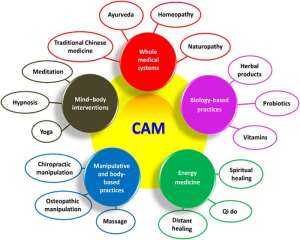
Ghana has moved to standardize the Profession of Complementary and Alternative Medicine as has been done in South Africa and other foreign countries. Complementary and Alternative medicine has been practiced in Ghana since the 1960s. However, the industry has faced many fragmentations which has affected its progression. “Complementary” refers to treatments that are used with conventional medicine while “Alternative” treatments are a substitute for conventional medicine. Examples are Naturopathy, Homeopathy, chiropractic, Ayurveda and Acupuncture.
In South Africa, the Allied Health Professions Council of South Africa (AHPCSA) is a statutory health body established in terms of the Allied Health Professions Act, 63 of 1982 (The Act), in order to control all allied or complementary health professions, which includes Aromatherapy, Ayurveda, Chinese Medicine, Acupuncture, Chiropractic, Homeopathy, Naturopathy, Osteopathy, Phytotherapy, Reflexology, Therapeutic Aromatherapy, Therapeutic Massage Therapy, Therapeutic Reflexology and Unani-Tibb.
In South Africa, persons with qualifications from private providers of education and training that do not have the South African Qualifications Authority (SAQA) registration and Council for Higher Education (CHE) accreditation are not considered for registration. Students of AHPCSA regulated professions are required by law to be registered with the AHPCSA whilst studying or face a penalty after graduating and when requesting registration as a practitioner/therapist. Graduates that do not register within six months of graduating will be required to undergo a competency assessment, at their own cost, to ensure that skills have not been lost due to a delay in registering.
National Sector Skills Body
Sector Skills Bodies are established to advise and provide recommendations for curriculum development. It is an advisory council that seeks to support the Ghanaian Government’s TVET strategy to build a skills system that produces a demand-driven, robust labour market and skills intelligence. The body’s aim is to achieve these goals by developing an understanding of the future skills needs in the industry, in order to reduce skills gaps and shortages, and to boost the skills of the sector workforce.
Additionally, the SSBs are expected to feed into the implementation of national and regional TVET strategies by giving recommendations to the Commission for Technical and Vocational Trainings (CTVET) to ensure that qualifications, curriculum and learning materials reflect the occupational standards and that learning materials are also widely accessible.
Each sector skill body is made up of 19 members consisting of representatives from industry associations and the public sector, including key TVET institutions, the Ghana Employers Association and the Trade Union Congress of Ghana.
The social dialogue will be facilitated by the CTVET Resource Person, Mr. Theophilus Tetteh Zogblah, Deputy Director, standards and Curriculum Development on 29th March, 2022, at the Top Universal College, opposite Gewah Homeopathic Hospital, Weija. The Program will be chaired by Dr. Albert Arthur, acting President of Ghana Alternative Medicine Practitioners Association(GAMPA).
The National Sector Skills for Complementary and Alternative Medicine was initiated by the Nyarkotey University College of Holistic Medicine & Technology (NUCHMT), a registered TVET institution and an educational member of the World Naturopathic Federation (WNF), Canada.
The College has also developed Ghana’s first occupational Standards for Naturopathy and Holistic Health Sciences at the Higher National Diploma (HND) and Bachelor of Technology levels.
Dr. Albert Arthur, acting President of Ghana Alternative Medicine Practitioners Association (GAMPA) is calling on all Practitioners in the Country to take part in this important national assignment which aims to change the face of the industry.
Standardization
Prof. Rahael Nyarkotey Obu, President of the Nyarkotey University College of Holistic Medicine & Technology (NUCHMT), has stated that standardization is paramount in any profession. There has to be a qualification framework for the profession and there can be no standardization policy without education.
Standards in education and qualification must meet the needs of candidates who want to practice as practitioners in the complementary and Alternative Medicine sector, and provide a background understanding of the sector and the practical skills and knowledge required.
The Naturopathic Researcher and Professor notes: “It allows candidates to learn, develop and practice the skills required for progression onto a professional Complementary and Alternative Medicine qualification or employment and/or career progression in the complementary therapies sector”.




 Elisu By-election: "If you call yourself a man, boo Chairman Wontumi again" — Bo...
Elisu By-election: "If you call yourself a man, boo Chairman Wontumi again" — Bo...
 Fuel tanker driver escapes with his life after tanker goes up in flames near Suh...
Fuel tanker driver escapes with his life after tanker goes up in flames near Suh...
 Uniform change: ‘Blue and white are brighter colours’ — Kwasi Kwarteng explains ...
Uniform change: ‘Blue and white are brighter colours’ — Kwasi Kwarteng explains ...
 MoE not changing all public basic school uniforms but only newly built ones — Kw...
MoE not changing all public basic school uniforms but only newly built ones — Kw...
 We’re only painting new public basic schools blue and white – Dr. Adutwum clarif...
We’re only painting new public basic schools blue and white – Dr. Adutwum clarif...
 Bawumia has lost confidence in his own govt’s economic credentials – Beatrice An...
Bawumia has lost confidence in his own govt’s economic credentials – Beatrice An...
 I fought WW2 at age 16 – WO1 Hammond shares At Memoir Launch
I fought WW2 at age 16 – WO1 Hammond shares At Memoir Launch
 GRA-SML deal: Regardless of what benefits have been accrued, the contract was aw...
GRA-SML deal: Regardless of what benefits have been accrued, the contract was aw...
 April 26: Cedi sells at GHS13.75 to $1, GHS13.18 on BoG interbank
April 26: Cedi sells at GHS13.75 to $1, GHS13.18 on BoG interbank
 Champion, promote the interest of women if you become Vice President – Prof. Gya...
Champion, promote the interest of women if you become Vice President – Prof. Gya...
